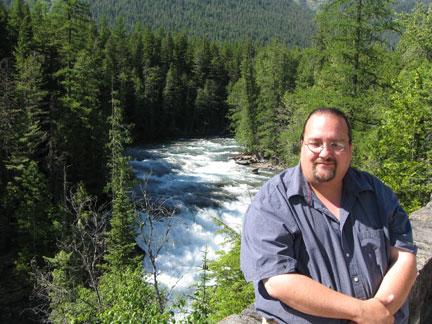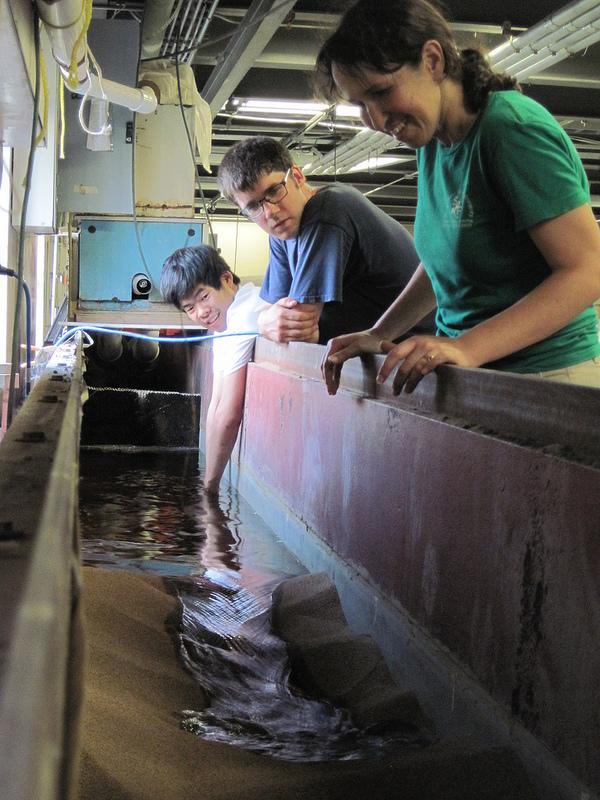The goal of NCED’s Diversity Initiative is to increase participation by underrepresented groups in NCED scientific disciplines until minority representation is continuously reflective of the US national population. This includes an immediate improvement in participation by members of all underrepresented groups in NCED itself, and a specific focus on improvement in representation of Native Americans in NCED-related disciplines. NCED collaborative activities for attracting and retaining Native American and other under-represented youth into Earth sciences include:
The gidakiimanaaniwigamig (Our Earth Lodge): Fond du Lac Tribal and Community College and NCED offer gidakiimanaaniwigamig ("Our Earth Lodge" in Anishinaabe) summer camps and year-round after-school programming for 6th through 8th grade students from the Fond du Lac Reservation and surrounding areas. Camps are held during the summer months and include a mix of lab science and field science programming, focusing on introducing the students to the scientific method and Native American culture.
The giiwed’anang (Northstar): The giiwed'anag Northstar Alliance strives to engage students in STEM-related activities, in order to encourage pursuing an education in two-year and/or four-year schools and universities. The Alliance also strives to create strong connections in Minnesota with the establishment of a student cohort network and new local AISES chapters.
The Geoscience Alliance: A national alliance of individuals committed to broadening participation of Native Americans in the geosciences. Its members are tribal colleges, universities, and research centers; native elders and community members; students (K12, undergraduate and graduate); formal and informal educators; and other interested individuals.
The Faculty-to-Faculty Program: The Faculty-to-Faculty Program (F2F) is an innovative program that NCED has developed to increase participation by underrepresented groups in NCED's scientific disciplines. Through this project, we build research ties with faculty members from schools with large minority enrollments, particularly minority-serving institutions (MSIs). Faculty to Faculty Program participants begin by visiting an NCED research facility or participating in a Workshop or Working Group. After these introductory activities, faculty who would like to continue working with NCED are invited to submit a written research proposal, which often takes the form of applying to become an NCED Visitor. Faculty to Faculty participants receive mentoring from NCED PIs, and students at their institutions are actively encouraged to apply to NCED research positions at the undergraduate and graduate level.
Research Experience for Undergraduates (REU) on Sustainable Land and Water Resources: This REU introduces undergraduate students to interdisciplinary research on sustainable land and water resources that is essential for improving management practices. Students will work on one of three teams using an interdisciplinary team-oriented approach that emphasizes quantitative and predictive methods. Student projects will integrate the Earth-surface dynamics, geology, ecology, limnology and paleolimnology, and hydrology principles and techniques required for sustainable land and water management and restoration.
The manoomin program: This five-year project (2009-2014), funded by the National Science Foundation, uses core samples from the bottoms of six lakes on the Fond du Lac Reservation to reconstruct the historical distribution and abundance of wild rice (manoomin, Zizania palustris) in six lakes on the Fond du Lac Reservation, and will connect this record with sedimentary indicators of lake level, nutrient conditions, and substrate composition, as well as with oral history and land use records. Tribal college, high school, and junior high students and their teachers conduct field work and laboratory research with guidance from University of Minnesota scientists, Fond du Lac Resource Management staff, and others.
National Consortium for Graduate Degrees for Minorities in Engineering and Science: GEM was established in 1976 to help place underrepresented students in programs of science and engineering. This involved placements on graduate programs and providing help in starting and then achieving masters and doctorates. The scheme was purley for US citizens. Graduate students who believe that this program was suitable for them and that fulfilled the criteria were invited to apply for financial assistance for attendance on STC-affiliated courses through out the US.
To learn more about the Diversity Program's latest projects and activities, see the NCED Annual Report.
For more information on NCED Diversity Programs, please contact:
Diana Dalbotten
Diversity Director
National Center for Earth-surface Dynamics
University of Minnesota
2 3rd Ave
Minneapolis, MN 55414

